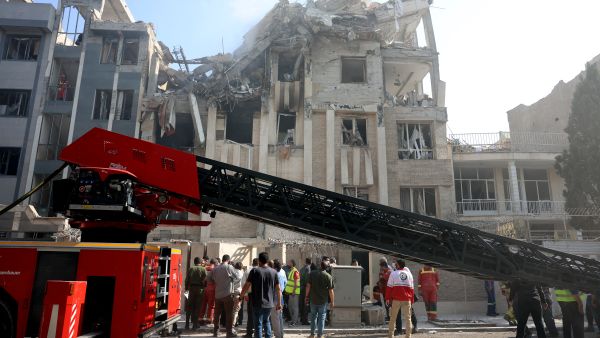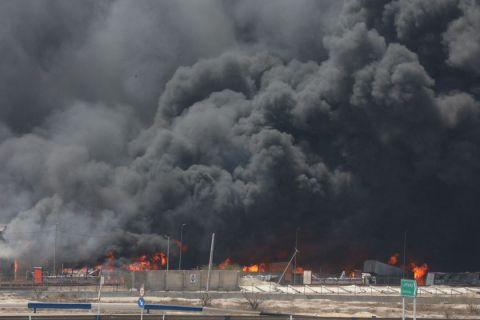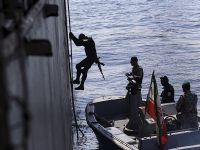ALBAWABA- In an unprecedented and sweeping military operation, Israeli airstrikes on early Friday killed several of Iran’s top military commanders and nuclear scientists in what appears to be the most significant decapitation strike in the history of the Iran–Israel conflict.
Iranian state media confirmed the death of Major General Mohammad Bagheri, Chief of Staff of Iran’s Armed Forces, alongside Major General Hossein Salami, commander of the Islamic Revolutionary Guard Corps (IRGC).
Following the strikes, Supreme Leader Ali Khamenei appointed former Quds Force commander Major General Ahmad Vahidi as the new IRGC chief. One of Bagheri’s top deputies was also killed, and reports indicate that Khamenei’s senior military advisor was among the casualties.
The strikes targeted multiple high-value sites across Iran, including a logistics support base and a ballistic missile installation near Tabriz in the northwest. Airstrikes also struck key military positions along the Iraqi border.
They hit critical nuclear infrastructure at Khondab, Khorramabad, and the heavily fortified Natanz uranium enrichment facility, which Iran's Atomic Energy Organization confirmed suffered “severe damage.”
In some areas of Tehran, airstrikes caused residential buildings, reportedly housing senior IRGC officials, to collapse. A provincial crisis management official in East Azarbaijan confirmed that at least two people were killed and six injured in strikes on the city of Tabriz, including damage to the Karimi military base in Saeedabad, the Al-Zahra garrison in Amand, and a radar center in Sardroud.
Four prominent Iranian nuclear scientists were among the dead: Fereydoun Abbasi (former head of Iran’s Atomic Energy Organization), Mehdi Tehranchi, Abdolrahim Minouchehr, and Ahmadreza Zolfaghari.
The assault, dubbed “Operation Rising Lion” by Israeli sources, marks a dramatic shift from Israel’s long-standing practice of targeted covert assassinations abroad to a large-scale, simultaneous strike inside Iranian territory.
Video footage broadcast by Iranian media showed airstrikes hitting the Chazzabeh border crossing and other strategic sites.
The Iranian government condemned the strikes as a blatant violation of its national sovereignty and accused Israel of acting “outside all international norms.” A government statement warned that Iran had begun “defensive, political, and legal” steps to make Israel “regret its actions.”
Supreme Iranian Leader Ali Khamenei vowed a harsh response, stating that Israel had “prepared a bitter and painful fate for itself” and asserting that those who follow the fallen commanders “will not let this go unanswered.”
Foreign Minister Abbas Araghchi blamed the United States for enabling the strikes, declaring that they “could not have happened without American approval or coordination,” and warning Washington of the consequences of this “reckless adventure.”
U.S. President Donald Trump responded in an interview by saying, “Iran cannot have a nuclear bomb, and we hope to return to the negotiating table. We’ll see.” He added that the U.S. would defend its assets, Israel, and allies if Iran retaliates.
International responses were swift. Oman condemned the Israeli aggression, while Saudi Arabia described the attack as horrific. Jordan emphasized that it would not allow its territory or airspace to be used by any party to attack another country, a veiled reference to both Israel and Iran.
The strikes come amid tense diplomatic backchannels between Iran and the United States, mediated by Oman, aimed at reviving a nuclear agreement that has long stalled. Tehran has reiterated that while it has not initiated war in over two centuries, it considers retaliation a legitimate right.










![Turkish series "Ask-ı Memnu" [Forbidden Love]. Turkish series "Ask-ı Memnu" [Forbidden Love].](/sites/default/files/styles/d02_traditional/public/2026-02/%D8%A3%D8%A8%D8%B7%D8%A7%D9%84-%D9%85%D8%B3%D9%84%D8%B3%D9%84-%D8%A7%D9%84%D8%B9%D8%B4%D9%82-%D8%A7%D9%84%D9%85%D9%85%D9%86%D9%88%D8%B9.jpg?h=c673cd1c&itok=nhq8-5rH)
